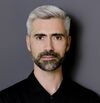|
4:00 PM-5:30 PM
Encounters in Belarus
Discussion|Angelika Krasheuskaya & Annett Gröschner in conversation, moderated by Jakob Racek
-
ACUD Club, Berlin
- Language English (with simultaneous translation into Belarusian)
- Price free entrance
- Part of series: Festival Goethe-Institut in Exile - Belarus

Annett Gröschner has travelled to Minsk several times, both as an author and as a member of the theatre collective She She Pop, which was invited by Angelika Krasheuskaya, the director of the TeArt Festival, in 2017. Angelika now lives in exile in Germany.
The two have even more in common: Angelika was born in Magdeburg, the daughter of a Soviet officer. Annett, also born in Magdeburg, is interested in the history of her city. A theatre piece based on their shared background has not worked out yet. Together with Jakob Racek, former director of the Goethe-Institut in Minsk, they talk about what is still missing for this project and what kind of perspectives are generally lacking in the German cultural scene.
Angelika Krasheuskaya was born in Magdeburg. She lived and worked in Minsk until November 2021. Professionally involved in theater since 2000, she was the ex-founder and ex-director of the Visual & Performing ART Centre ART Corporation in Minsk, as well as the Art Director/Director of the International theatre forum TEART and Festival Director of the Minsk International Film Festival LISTAPAD from 2010 to 2021. She also served as Director, manager and producer of the Theatre independent project - TOKtheatre from 2012 to 2021. Since 2021, she has been a member of the Belarus Theatre community. She has been residing in Hamburg since November 2021.
The two have even more in common: Angelika was born in Magdeburg, the daughter of a Soviet officer. Annett, also born in Magdeburg, is interested in the history of her city. A theatre piece based on their shared background has not worked out yet. Together with Jakob Racek, former director of the Goethe-Institut in Minsk, they talk about what is still missing for this project and what kind of perspectives are generally lacking in the German cultural scene.
Guests
Annett Gröschner, born in Magdeburg in 1964, has lived in Berlin since 1983. She studied German literature in Berlin and Paris and has been a freelance writer, journalist and lecturer since 1997. She has been a guest performer with She She Pop since 2012. Most recently she published: Drei ostdeutsche Frauen betrinken sich und gründen den idealen Staat (with Peggy Mädler and Wenke Seemann).Angelika Krasheuskaya was born in Magdeburg. She lived and worked in Minsk until November 2021. Professionally involved in theater since 2000, she was the ex-founder and ex-director of the Visual & Performing ART Centre ART Corporation in Minsk, as well as the Art Director/Director of the International theatre forum TEART and Festival Director of the Minsk International Film Festival LISTAPAD from 2010 to 2021. She also served as Director, manager and producer of the Theatre independent project - TOKtheatre from 2012 to 2021. Since 2021, she has been a member of the Belarus Theatre community. She has been residing in Hamburg since November 2021.
Moderation
Jakob Racek is head of the information department at the Goethe-Institut's head office in Munich. He was previously director of the Goethe-Institut Minsk, which had to cease its activities due to repression by the Belarusian regime. He has worked as a curator and cultural manager for German and international galleries and institutions, including the Staatliche Kunsthalle Baden-Baden and the Robert Bosch Stiftung.Location
ACUD Club
Veteranenstraße 21
10119 Berlin
Germany
Veteranenstraße 21
10119 Berlin
Germany
Location
ACUD Club
Veteranenstraße 21
10119 Berlin
Germany
Veteranenstraße 21
10119 Berlin
Germany


